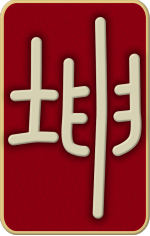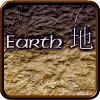
坤 Kūn Acceptance (Responding) [hexagram 2]

 Earth element
Earth element
Lunar month: 10 ; Host (controlling) line : 2
The Decision
‘Acceptance’ brings glorious success like a mare’s loyalty. The wise can take on any undertaking but if they assume leadership they will go astray. Favorable to seek new friends in the south and west but lose them in the north and east. By remaining steadfast and upright there will be success.
Supreme is the greatness of acceptance; it is the source of all things, accepting the will of Heaven. Acceptance in its vastness supports everything. It equals the huge power of ‘beginning’; its scope is immense – matching its brilliance. Through it all things reach their maturity. The mare is the Earth’s spirit, wandering the limitless world; she is mild and obedient and rewards persistence. The wise follows her character. ‘But if they assume leadership they will go astray’ – by missing the proper way. Following her lead will give instruction. ‘To seek new friends in the south and west’ – walking with kindred spirits. ‘But lose them in the north and east’ – but eventually all will be well. ‘By remaining steadfast and upright there will be success’ – corresponding to the limitless capacity of the Earth.
坤: 元亨, 利牝马之贞. 君子有攸往, 先迷后得主, 利西南得朋, 东北丧朋. 安贞, 吉. Kūn: yuán hēng, lì pìn mǎ zhī zhēn. Jūn zǐ yǒu yōu wǎng, xiān mí hòu dé zhǔ, lì xī nán dé péng, dōng běi sāng péng. Ān zhēn, jí.
彖传: 至哉坤元, 万物资生, 乃顺承天. 坤厚载物, 德合无疆. 含弘光大, 品物咸亨. 牝马地类, 行地无疆, 柔顺利贞. 君子攸行, 先迷失道, 后顺得常. 西南得朋, 乃与类行; 东北丧朋, 乃终有庆. 安贞之吉, 应地无疆. Tuàn zhuàn: Zhì zāi kūn yuán, wàn wù zī shēng, nǎi shùn chéng tiān. Kūn hòu zǎi wù, dé gě wú jiāng. Hán hóng guāng dà, pǐn wù xián hēng. Pìn mǎ de lèi, háng de wú jiāng, róu shùn lì zhēn. Jūn zǐ yōu háng, xiān mí shī dào, hòu shùn dé cháng. Xī nán dé péng, nǎi yú lèi háng; dōng běi sāng péng, nǎi zhōng yǒu qìng. Ān zhēn zhī jí, yìng de wú jiāng.
The Image
Earth sustains and responds. The wise as a consequence of their virtue sustain everything.
象传: 地势坤, 君子以厚德载物. Xiàng zhuàn: Dì shì kūn, jūn zǐ yǐ hòu dé zǎi wù.
Line Change 1
Walking on frosty ground. Freezing conditions will follow.
‘Walking on frosty ground. Freezing conditions will follow.’ – the cold is taking hold. It is in its nature to freeze hard.
初六: 履霜, 坚冰至. Chū liù: lǚ shuāng, jiān bīng zhì.
象传: 履霜坚冰, 阴始凝也. 驯致其道, 至坚冰也. Xiàng zhuàn: Lǔ: shuāng jiān bīng, yīn shǐ níng yě. xùn zhì qí dào, zhì jiān bīng yě.
Line Change 2
Unbent, square and complete. Not requiring repetition, nothing is unfavorable.
The motion is from the straight to square. ‘Not requiring repetition, nothing is unfavorable’ – demonstrating the natural way of Earth.
六二: 直, 方, 大, 不习无不利. Liù èr: zhí, fāng, dà, bù xí wú bù lì.
象传: 六二之动, 直以方也. 不习无不利, 地道光也. Xiàng zhuàn: Liù èr zhī dòng, zhí yǐ fāng yě. bù xí wú bù lì, dì dào guāng yě.
Line Change 3
Persist in the restraint of conceit; serving the leaders and showing humility will bring honor.
‘Persist in the restraint of conceit’ – pride can be shown only at the appropriate time. ‘Serving the leaders’ – showing sound judgment.
六三: 含章可贞. 或从王事, 无成有终. Liù sān: hán zhāng kě zhēn. huò cóng wáng shì, wú chéng yǒu zhōng.
象传: 含章可贞; 以时发也. 或从王事, 知光大也. Xiàng zhuàn: Hán zhāng kě zhēn; yǐ shí fā yě. huò cóng wáng shì, zhī guāng dà yě.
Line Change 4
The bag is sealed. No blame and no praise.
‘The bag is sealed’ – with care there will be no trouble.
六四: 括囊; 无咎, 无誉. Liù sì: kuò náng; wú jiù, wú yù.
象传: 括囊无咎, 慎不害也. Xiàng zhuàn: Kuò náng wú jiù, shèn bù hài yě.
Line Change 5
Golden dress – very promising.
‘Golden dress – very promising’- it is the correct and central place.
六五: 黄裳, 元吉. Liù wǔ: huáng cháng, yuán jí.
象传: 黄裳元吉, 文在中也. Xiàng zhuàn: Huáng cháng yuán jí, wén zài zhōng yě.
Line Change 6
Dragons battle in the wilderness. Their blood is blue and yellow.
‘Dragons battle in the wilderness’ – until totally exhausted.
上六: 龙战于野, 其血玄黄. Shǎng liù: lóng zhàn yú yě, qí xuè xuán huáng.
象传: 战龙于野, 其道穷也. Xiàng zhuàn: Zhàn lóng yú yě, qí dào qióng yě.
Enduring perseverance will bring great advantage.
Transformed to all that is everlastingly correct, greatness at the end.
用六: 利永贞. Yòng liù: lì yǒng zhēn.
象传: 用六永贞, 以大终也. Xiàng zhuàn: Yòng liù yǒng zhēn, yǐ dà zhōng yě.
The full set of 64 English translations is available in our new book 'Book of Changes - Deciphered' ➚.